
Tawakkol Karman
Tawakkol Karman, born in 1979, is a Yemeni journalist, politician, and human rights activist.
Tawakkol has worked as a journalist since earning a degree in political science from Sana’a University. As a journalist, she wrote extensively and bravely about injustices and civil rights violations, despite the country’s severely restricted media environment. In 2005 she cofounded the organization Women Journalists Without Chains to advocate for freedom of the press, and worked as a campaigning journalist, reporting on government injustice and human rights issues, including malnutrition and illiteracy among girls.
She came into prominence in Yemen after 2005 as a journalist and an advocate for press freedom. She was a vocal opponent of the rule of President Ali Abdullah Saleh. From 2007 to 2010, Tawakkol regularly led demonstrations and sit-ins in Tahrir Square, Sana’a. Her involvement in demonstrations and actions critical of the Yemeni regime led to her arrest and murder threats on several occasions. She redirected the Yemeni protests to support the “Jasmine Revolution,” as she called the Arab Spring, after the Tunisian people overthrew the government of Zine El Abidine Ben Ali in January 2011.
President Ali Abdullah Saleh was forced to resign in February 2012. In May 2015, Saleh allied with the rebels during the Yemeni Civil War, in which a protest movement and subsequent insurgency succeeded in capturing Sana’a. Saleh was later killed by the very Houthis.
Like many Yemenis, Tawakkol was forced to leave her country after the capital’s takeover by Houthi rebels amidst the deteriorating security situation. She became a Turkish citizen in 2012. From her new home in Istanbul, Karman continues to speak out against injustices committed in Yemen, including the war waged by the Saudi-UAE-led coalition and US drone attacks in her homeland.
Tawakkol Karman was awarded the Nobel Peace Prize in 2011. She was the first woman to win the Prize from the Arab world. Since then, she has been promoting the struggle for democracy and human rights in Yemen at the international level, including at the UN.
On Yemeni women, she said once, “Women should stop being or feeling that they are part of the problem and become part of the solution. We have been marginalized for a long time, and now is the time for women to stand up and become active without needing to ask for permission or acceptance. This is the only way we will give back to our society and allow for Yemen to reach the great potential it has.”
She has alleged that many Yemeni girls suffer from malnutrition so that boys could be fed and also called attention to high illiteracy rates: two-thirds of Yemeni women are unable to read. She has been advocating for laws that would prevent females younger than 17 from being married.
Tawakkol has established the Tawakkol Karman Foundation, an endowment fund that strives to be a pioneer in the development, peacemaking, democratization, and good governance sectors, through the provision of development programs and training, mobilization and advocacy, aid, and relief programs. The foundation empowers women to take the lead in their communities, in cooperation with governments, civil society organizations, the private sector, and donor community, to serve humanity.
Tawakkol Karman is married with three children.
